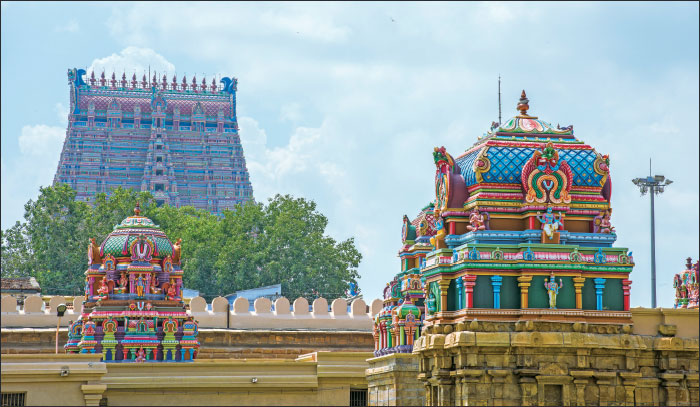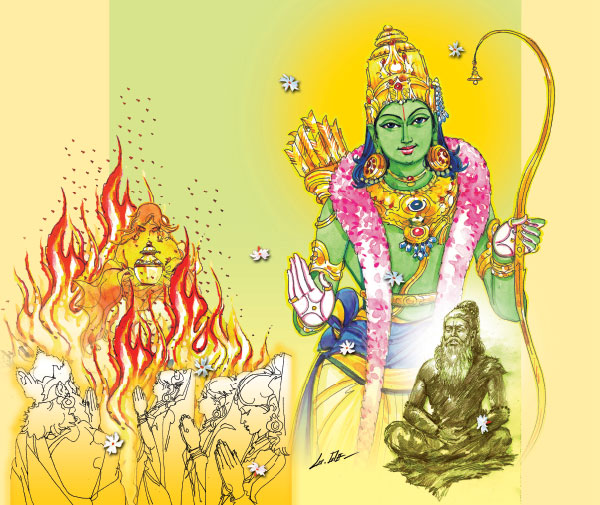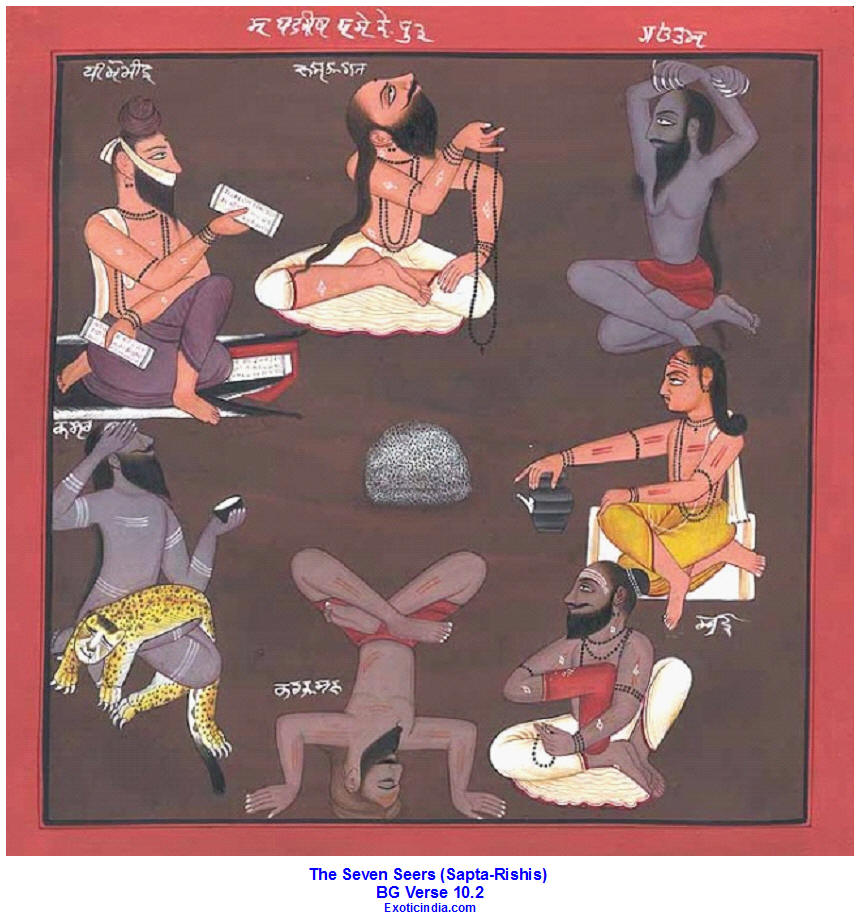Revised Nov 12, 2018
Author Indira Saundarrajan
Accepting the invitation by Dasaratha, Dharmavarma reached Ayodhya. As soon as he saw Emperuman in Praṇavākāra Vimanam, he felt the emotion and horripilation that Ikṣvāku experienced. He (His mind) had the audacity and courage to bring Emperuman’s temple to Chola country by doing Tapas like Ikṣvāku. As Dharmavarma’s thoughts dwelled on Praṇavākāra Perumal, Dasaratha on the other side was in intense pursuit of making arrangements for the fire sacrifice.
Ayodhya was eagerly waiting for the great muni Riṣyasiruṅgar. His reputation was he was a rainmaker wherever there was his footfall; prosperity danced. (His reputation was he brought rain wherever he visited.) The joyous kings celebrated his arrival. Dasaratha brought Riṣyasiruṅgar of such fame in the forefront of the gathering, seated him as the special guest and began his fire sacrifice. Dasaratha delivered the supplicatory address to the audience.
Dasaratha in the adulation of Riṣyasiruṅgar, the assembled Munis and Ṛṣis said, “Welcome Riṣyasingar, the great Muni of all times. You have set your sacred feet to the delight of Kosala Country. Welcome Vasiṣtar Māmuni, the guiding Kulaguru of the Ravi Kulam! Welcome to the Ṛṣis and Munis who have come in throngs for the fire sacrifice!

My dear and friendly kings! You have established many countries in this world and are ruling them with sagacity. My dear subjects have shown me love and affection. Welcome priests and directors of these planned events! These events will bring joy to all of you. I invite you all with my heart and salute you.
This fire sacrifice is about to happen because of the grace of Praṇavākāra Perumal who blessed the Ravikulam and came down to Kosala country. The main thrust of this Vēḷvi is for the maintenance of peace in the Bhūlōka and avoidance of hunger and famine. The next purpose of this Vēḷvi is for the prosperity and continuity of Ravikulam and progeny for me.
This opportunity to conduct the Vēḷvi would not have come if I had children of my own. I would not have had the fortune to meet with all of you on the Sarayu riverbank. I feel that the blessing of having my progeny is yet to come true.
Dasaratha: “Let this fire sacrifice bring prosperity and goodness to the people. Let all our faults and deficiencies come to an end from the grace of our Kula Daivam Araṅganātha Peruman. Let me pay homage to the anklets of Perumal who went from Vaikuntam to Satyalokam and to Ayodhya in Bhūlōkam, which became the Bhūlōka Vaikuṇṭam. I will begin the Vēḷvi now.” This speech made Dharma Varma think hard.
The sacrificial hall with seats in a circular fashion for the kings was in front of the Praṇavākāra Perumāḷ sacred sanctum. Dharma Varma’s sight from his seat past the Vēḷvi was in straight line to Praṇavākāra Perumāḷ’s holy sanctum. The sanctum-abiding Araṅganāthar’s appearance made Dharma Varma entertain a multitude of thoughts.
Dharma Varman: Emperumānē! To show your support to your Baktha, you descended from the heavens to the earth and remain in the temple. What else can we call your mercy? How much effort have I expended coming from south to north to see your Archa form? Could my subjects come here as I did? Is it at all Possible? For them, is your Darśan an unattainable dream?”
“You have seen Vaikuntam, Satyalokam, and Ayodhya. Why can’t you come to Chola Nadu, the fourth place? We will celebrate your presence with great fanfare and joy more than what Ravikulam does.”
“There is only one supplication in this Vēḷvi. Do you know what my supplication is? You must take your place in the temple in my Chola Nadu. Until you reach my grounds, that is my only thought. That is the aim of all my life.”
Dharma Varman went back to Chola Nadu and spoke with his ministers and poured his heart out to them. The council of ministers addressed his desire as follows. “King, your desire is lofty. We can obtain anything from God. However, Dasaratha Chakravarthy is a human being born of parents like you. He is of flesh and blood. How could we entreat him to give up on Perumāḷ? War against him is an option. It is not feasible for us. Enmity is the centerpiece of war. Dasaratha entertains love, friendship, and conciliation to us. How could we show enmity to him? There is no chance your desire will come to fruition. If desired, we can build a temple just like it here in our country.”
Dharma Varman: “No, we can build 100 temples like it here. However, they are all not endowed with divinity (சான்னித்தியம்) as in Vaikuntam. Emperuman created the Praṇavākāram and the idol. That Swamy has not felt the chisel (= It is not man-made or made by anyone.). It is gold not melted and molded into a form.
With the idol, there are deities, Siddha-attendants in continuous service to the Lord, Thumburu, constant Vina music by Narada and Chandra-Surya operating the fan. (There are deities, Siddha attendants and Thumburu in regular service to Perumal.) Narada Vīnagāṉam plays constantly. Chandra and Surya work the fan. How do all these possibilities come together in a temple we build?
The council of ministers maintained silence to the questions posed by Dharmavarman.
Dharmavarman: My dear ministers! One person brought Peruman from the heavens to the earth. Is it hard to move Perumal from north to south? I decided I am following the erstwhile (tried and true) path of Ikṣvāku. The ministers were shocked and flabbergasted.
The ministers: O King! Tapas is not an ordinary matter. The senses of Kṣatriya men are not amenable to control easily. That observation by a minister brought anger in the king.

Dharmavarma: “Easy satisfaction it has nothing to do with body’s sensual and physical needs. It is the liberation of Ātma. Araṅganāthar is my god of freedom. I am the second Ikṣvāku.” Soon Dharmavarma sat for a great Tapas.
The events of the period, as the time rolled on, were the Tapas by Dharmavarma, completion of Dasaratha’s fire sacrifice, and the birth of SrīRāmar, Bharata, Lakshmana, and Śatrughna.
Everyone came to know of Dharmavarma’s Tapas. Munis living in the Āśramas on the Kaveri riverbank such as Thālapyar, the disciple of Pulastya Muni and others learned of the king’s Tapas and came to the camp. They had horripilation when they saw the king in Tapas. They sprinkled flower petals on him without interfering with his Tapas.
The showered flowers and their fragrance made Dharmavarman’s eyes open. Seeing the Munis before him, he, in a state of surprise, got up and paid them homage.
Dharmavarman: “Many greetings to you, the great Munis. You are entitled to my greetings.”
The Munis: Thanks a lot, our king! Your presence is a great joy for us. Our best wishes to you.”
Dharmavarman: “Many thanks. May I know who you are?”
The Munis: The reason we are here is to let you know that the purpose of your Tapas will come true.”
Dharmavarman: My great wish will bear fruits. Is it true? Your servant that I am is a fortunate person.”
The Munis: “Yes! However, it is not now or tomorrow.”
Dharmavarman: Meaning…?
The Munis: Understand first what we are about to tell you. Later, everything will occur to you.”
Dharmavarman: “Good! Tell me unhesitatingly whatever you came to say”.
The Munis: First, you must give up the Tapas platform. Give us the seats and approach us in the capacity and quality of a disciple.”
Dharmavarman conducted himself the way they suggested. The Munis sat on a higher platform covered with a silk spread. Dharmavarman sat at a lower level on the bare floor. The Munis explained what they came to say.
The Munis: King! We are the disciples of Thālapyar Muni performing Tapas on the banks of Kaveri river. We will communicate to you the news we carried from him. Nīlivanam is a forest about 50 Kāthams (500 miles) from here. The woods has unique features, suitable for Munis like us to perform Tapas. An Asura (Antigod, demon) by name Vyākkiran is a danger to us. He declared that it was his hunting ground; no one could perform Tapas there and ordered the Tapasvins to pay respects to him.
We refused to comply with his demands knowing that to talk about the despicable Asura with the same mouth that chanted the name of the Supreme, is despicable. He killed many of us and made others eat the human flesh of our dead colleagues.
The Munis: Jnani’s body and God’s temple are one. That sacred body is becoming food. Though we were not used to anger, we became angry with him. Considering Emperuman, we indulged in severe Tapas: inside the water and the fire, standing on one leg, and hanging upside down according to one’s ability.

The Devas came running to offer us the fruits of our Tapas, performed to establish righteousness and with no expectation of material benefits. Emperuman was not far behind. He appeared and killed Vyākkiran and praised our Tapas.
The Munis: Then, we all offered our gratitude to Vyākkiran the Tiger-demon, because of him only, we obtained the impossible Darśan of Emperuman. Once we saw him, Emperuman disappeared.
Emperuman’s Darśan caused us bewilderment. We were eager to receive more Darśan of Perumal again. We immersed in Tapas again. This time the object of Tapas changed. Before, we trembled for our lives. Now we are eager to fulfill a desire.
Munis: We do not like auspicious events blown away and forgotten by the flood of time: The merciful deed of Emperuman and the Tapas by the Munis. We performed severe penance to have daily Darśan of Emperuman and to establish a temple for him on this land of ours as in Ayodhya. As the fruit of our Tapas, we heard a voice from heaven (disembodied voice). We listened to this that was pleasing to our ears.
The Disembodied Voice: “Great Munis! I am pleased with your Tapas. Your desire will come to fruition in the coming years. The world should know what Dharma is. Asuras like Vyākkiran should die. For these purposes, I will incarnate myself. Ayodhya, the Bhuloka Vaikuntam, will be my birthplace. The king of Ayodhya will be my father.” (Incarnate Rama will be the son.)
In this birth, one of my acts will be the establishment of your beloved temple with a full complement of my divinity in the coming years. I will have permanence spanning beyond Yugas. Tell Dharmavarman in Tapas this news and ask him to wait for me. Long live your devotion! Let your treasure-trove of Grace grow! That disembodied voice resounded in the firmament and subsided. We are here to tell you this message from the sky.
As the Munis finished describing everything in great detail, Dharmavarma was joyous in his heart and soul. That moment, the resident cow in the cow Stall bellowed, ‘MMA,’ -the mooing sound of the cow. That made him doubly ecstatic.
To be continued.
